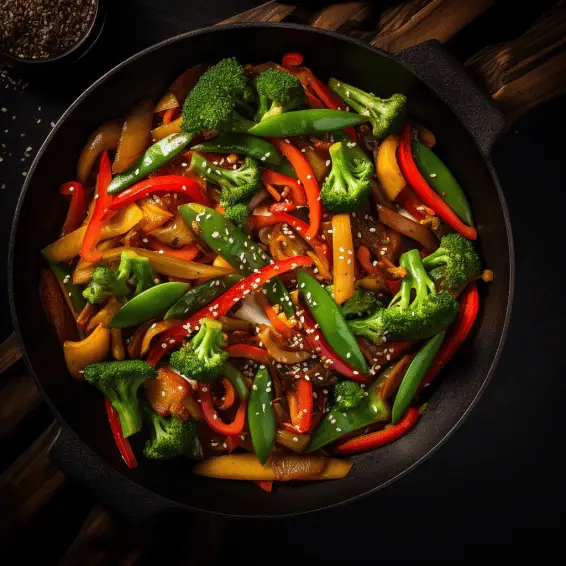
Did you know that ginger has been used for its medicinal properties for centuries? In fact, it’s one of the most popular and widely used herbs in traditional Chinese medicine.
But beyond its health benefits, ginger is also a common ingredient in Chinese cuisine, adding a unique flavor and aroma to dishes.
According to research, ginger contains compounds that have anti-inflammatory and antioxidant properties. This means that consuming ginger may help reduce inflammation in the body, boost immunity, and even improve brain function.
Additionally, many people use ginger as a natural remedy for nausea or digestive issues. With all of these potential health benefits, it’s no wonder why ginger has become such a staple ingredient in Chinese cooking.
So let’s explore how this humble root can enhance your next low-sodium Chinese dish!
KEY TAKEAWAY
What is ginger?
Ginger is a flavorful and versatile ingredient that can be used to enhance the taste of low sodium Chinese food. Its natural spiciness adds a zing to dishes, allowing you to reduce the reliance on sodium for flavor.
Incorporating ginger in your cooking not only adds depth to your meals but also offers numerous health benefits, such as aiding digestion and reducing inflammation. Embrace ginger to elevate the taste and nutritional value of your low sodium Chinese dishes.
What are the health benefits of ginger in Chinese cuisine?
You’ll be amazed at the health benefits of ginger, especially in Chinese cuisine! Ginger has been used for centuries in traditional Chinese medicine to treat various ailments. It’s known for its anti-inflammatory properties and can help relieve pain, reduce nausea, and improve digestion. In addition, ginger contains antioxidants that can boost your immune system.
When it comes to cooking with ginger in Chinese dishes, the possibilities are endless. Ginger can be used fresh or dried and ground into a powder. It adds a spicy kick to stir-fries, soups, and marinades. One popular dish is hot and sour soup which includes ginger as a key ingredient. This soup is believed to have medicinal properties that can help alleviate cold symptoms.
Ginger also enhances the flavor of low sodium Chinese dishes by providing a bold taste without adding salt. This is particularly important for those who need to watch their sodium intake due to health concerns such as high blood pressure. So not only does ginger add a unique flavor profile to Chinese cuisine, but it also offers numerous health benefits that make it an essential ingredient in any kitchen!
How does ginger enhance the flavor of low sodium Chinese dishes?
Adding a touch of ginger to low sodium Chinese dishes can elevate their flavor profile without relying on salt. Ginger has a unique and pungent taste that adds depth to the dish, making it more complex and interesting. The spice also has a warming quality that makes it perfect for winter meals or when you want something comforting.
Apart from its flavor-enhancing properties, ginger is also known for its health benefits. It contains compounds that have anti-inflammatory effects and may help reduce nausea, improve digestion, and lower cholesterol levels. By incorporating ginger into your low sodium Chinese dishes, not only are you making them tastier but also healthier.
So whether you’re cooking stir-fries, soups, or steamed dishes with less salt than usual, adding some grated or sliced ginger can make all the difference in terms of flavor and nutrition.
What are some traditional Chinese recipes that incorporate ginger? Let’s find out in the next section.
What are some traditional Chinese recipes that incorporate ginger?

Get ready to spice up your taste buds with these traditional Chinese recipes that bring warmth and depth to your low sodium dishes. Ginger is a staple ingredient in many of these dishes, providing a unique flavor profile that complements the other ingredients.
One popular dish is ginger chicken, where thin slices of ginger are cooked with chicken and vegetables in a savory sauce. Another well-known recipe is hot and sour soup, which features ginger as one of its main seasonings.
Another tasty recipe featuring ginger is stir-fried beef with broccoli. The thinly sliced beef is marinated in soy sauce, rice wine, and cornstarch before being quickly stir-fried with fresh ginger and garlic. The resulting dish has layers of flavor from the tender beef, crunchy broccoli florets, and aromatic seasoning of ginger.
For a vegetarian option, try stir-fried vegetables with tofu using similar techniques but substituting the protein for firm tofu.
As you can see, there are many traditional Chinese recipes that incorporate ginger as a key ingredient. Not only does it add an enticing depth of flavor to dishes but also provides numerous health benefits such as reducing inflammation and aiding digestion.
Now let’s explore how else you can use this versatile root vegetable in your cooking by learning whether it can be used as a substitute for salt in Chinese cuisine.
Can ginger be used as a substitute for salt in Chinese cooking?
If you’re looking to reduce your sodium intake, consider experimenting with spices and herbs to enhance the flavors in your Chinese dishes. Ginger is a popular ingredient used in many traditional Chinese recipes as it adds a unique flavor and aroma. (1)
While it may not directly substitute for salt, using ginger can help reduce the amount of salt needed in a dish without sacrificing taste. Ginger has been shown to have numerous health benefits, including anti-inflammatory properties and aiding digestion.
Using ginger in your cooking not only adds flavor but also contributes to a balanced and healthy Chinese diet. It can be used in stir-fries, soups, marinades, and even tea. Incorporating ginger into your Chinese cooking is an easy way to add depth of flavor while also promoting good health.
Experiment with different ways of using it and find what works best for you and your family’s taste preferences. Moving on to the next section, let’s explore how else ginger contributes to a balanced and healthy Chinese diet beyond just its use as a salt substitute.
How does ginger contribute to a balanced and healthy Chinese diet?
With its warm and spicy flavor, ginger is a staple ingredient in Chinese cuisine that provides numerous health benefits. (2)
Ginger has anti-inflammatory properties that can help reduce pain and inflammation in the body. It also aids digestion by stimulating the production of digestive juices and enzymes, which can alleviate stomach discomfort such as bloating, gas, and indigestion.
Moreover, ginger contains essential nutrients such as vitamin B6, magnesium, and potassium that support overall health. These nutrients are important for maintaining healthy blood pressure levels and promoting heart health.
Additionally, ginger has been shown to have anti-cancer properties due to its high concentration of antioxidants.
Overall, incorporating ginger into your diet can contribute to a balanced and healthy lifestyle. Its many health benefits make it an excellent addition to any meal.
In the next section, we’ll discuss whether or not ginger is suitable for individuals following a low sodium or salt-restricted diet.
Is ginger suitable for individuals following a low sodium or salt-restricted diet?
When watching your sodium intake, incorporating flavorful spices can be a great way to add depth to dishes without relying on salt. Ginger is one such spice that can be used in various Chinese recipes to enhance their flavor profile. Additionally, ginger has been found to have numerous health benefits, including reducing inflammation and aiding digestion.
For individuals following a low sodium or salt-restricted diet, ginger can be an excellent ingredient to use as it doesn’t contain any significant amount of sodium. It also adds a unique flavor that complements other spices commonly used in Chinese cuisine like garlic and scallions. You can use fresh or dried ginger depending on the recipe’s requirements.
Incorporating ginger into your Chinese dishes not only helps reduce your sodium intake but also adds a distinctive taste and aroma to the food. One creative way of using ginger is by adding it to stir-fried vegetables or meats for an extra kick of flavor. Another option would be making ginger tea by simmering sliced fresh ginger in water with honey and lemon juice for added sweetness and tanginess.
The possibilities are endless when it comes to using this versatile spice in Chinese cooking!
What are some creative ways to use ginger in Chinese dishes?
Now that we know ginger is a great addition to a low sodium diet, let’s explore some creative ways to use this flavorful root in Chinese dishes. Ginger is an essential ingredient in Chinese cuisine and adds depth and warmth to dishes such as stir-fries, soups, and steamed fish.
Here are three ideas for using ginger in your next Chinese meal:
- Grate fresh ginger into your marinade: Marinating meats or tofu with ginger adds flavor and tenderizes the protein. Mix grated ginger with soy sauce, rice vinegar, sesame oil, sugar, and garlic for a zesty marinade.
- Add sliced ginger to hot oil: Slicing fresh ginger thinly and adding it to hot oil before stir-frying vegetables or proteins infuses the dish with its aroma and flavor.
- Make ginger tea: In addition to being a delicious beverage on its own, boiling slices of fresh ginger in water can be used as a base for soups or stews or added to steamed rice for extra fragrance.
Ginger is generally considered safe when used in moderation but as with any food or herb, there are precautions you should take when cooking with it. In the next section, we’ll discuss potential side effects of consuming too much ginger or contraindications for certain medical conditions so you can enjoy this versatile ingredient safely.
Are there any potential side effects or precautions when using ginger in Chinese cooking?
You might want to be aware of some precautions and potential side effects before cooking with ginger in your Chinese dishes. While ginger is generally considered safe for consumption, it can cause certain side effects in some people.
For example, consuming large amounts of ginger may lead to heartburn, bloating, and gas. Additionally, people who are taking blood thinners or have a history of gallstones should consult their doctor before consuming ginger as it may interfere with the medications or worsen the condition.
It’s also important to note that not all types of ginger are created equal. Some varieties may contain high levels of compounds that can cause adverse reactions in certain individuals. For instance, shogaols and zingerones found in dried or cooked ginger may irritate the stomach lining and increase the risk of acid reflux. On the other hand, fresh ginger contains more gingerols which have anti-inflammatory properties and are less likely to cause digestive discomfort.
To avoid any potential side effects while cooking with ginger in Chinese dishes, it’s best to use it in moderation and choose fresh over dried whenever possible. You can also peel off the skin before using it as this reduces its pungency and makes it easier to digest.
Lastly, if you experience any adverse reactions after consuming ginger or notice any unusual symptoms like rashes or swelling, seek medical attention immediately.
Conclusion
Congratulations! You’ve learned about the many health benefits of ginger in Chinese cuisine.
By incorporating this versatile ingredient into your cooking, you can enhance the flavor of low-sodium dishes and contribute to a balanced and healthy diet.
Ginger is not only a delicious addition to traditional Chinese recipes, but it can also be used as a substitute for salt in cooking. For individuals following a low-sodium or salt-restricted diet, ginger can provide an excellent alternative without sacrificing flavor. However, it’s important to note that there may be potential side effects or precautions when using ginger in large quantities or if you have certain medical conditions, so always consult with your healthcare provider before making any major changes to your diet.
In conclusion, by incorporating ginger into your Chinese cooking, you’re not only adding depth of flavor but also reaping numerous health benefits.
Whether it’s grated fresh into stir-fry dishes or brewed into tea for its soothing properties, ginger is truly a symbol of good health and culinary creativity.
So go ahead and experiment with this versatile ingredient – your taste buds (and body) will thank you!
References
- https://www.escoffieronline.com/5-spices-to-use-instead-of-salt/
- https://tamaratcm.com/health-benefits-of-ginger/
Was this helpful?

I am a skilled chef assistant with a passion for Asian cuisine, I have honed my craft through formal training at At-Sunrice GlobalChef Academy and years of experience in the culinary industry. I have extensive knowledge of cooking techniques and herbs and spices, with a particular focus on traditional Chinese dishes. I’m also an author of the book “Delicious Keto Low Carb Chinese Food for Busy Moms and Fitness Enthusiasts” which is sold on Amazon. On my blog, bowlakechinese.com, I share my expertise in Asian cuisine and provide tips and recipes for those interested in low carb Chinese cuisine.
